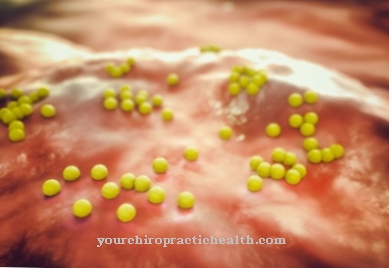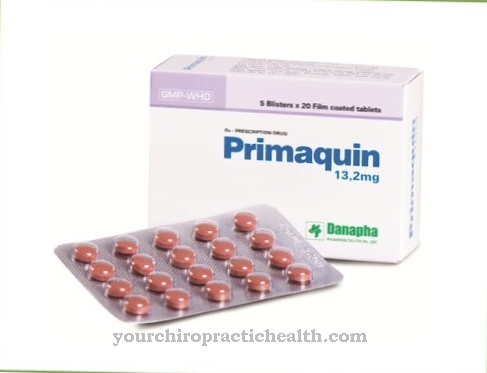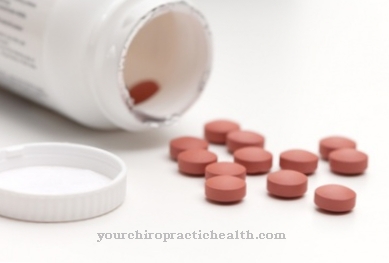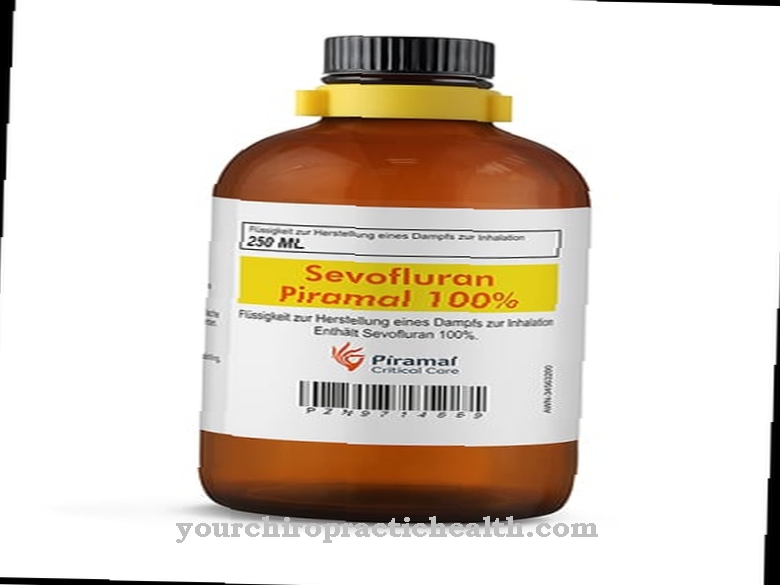At Teicoplanin is a pharmacological agent that belongs to the group of antibiotics.For this reason, the drug is primarily used to treat infections caused by various types of bacteria. The substance teicoplanin is particularly effective against so-called gram-positive germs.
What is teicoplanin?

The drug teicoplanin is included in the pharmacological category of antibiotics. From a chemical point of view, this antibiotic is a member of the group of glycopeptides. In order to create the basis for medical use, the active substance teicoplanin is isolated from a special type of bacteria in the first step. This strain of bacteria is Actinoplanes teichomyceticus.
In principle, antibiotics from the group of glycopeptides are reserve antibiotics. These are only suitable for the treatment of infectious diseases that are triggered by gram-positive bacteria. Corresponding drugs are only administered when other drugs are no longer effective, for example due to resistance.
The antibiotic teicoplanin is only traded as a first-line agent in one single case and not as a reserve antibiotic. If there is pseudomembranous colitis associated with other antibiotics, the glycopeptide teicoplanin should be administered immediately. Basically there are two types of the active ingredient: Teicoplanin and Vancomycin.
Pharmacological effect
Teicoplanin is primarily characterized by its bactericidal, i.e. bacteria-killing effect. To a certain extent, the substance also shows bacteriostatic effects when it is used in the therapy of anaerobic and aerobic germs. The drug is also effective against anaerobic gram-positive pathogens.
The effect of the drug is due to the fact that it inhibits the synthesis of the cell walls of bacteria. For this reason, teicoplanin prevents the pathogen from multiplying. This effect is typical for antibiotics from the group of glycopeptides, since all representatives of this category inhibit the formation of bacterial cell walls in gram-positive germs.
For this reason, the use of the active ingredient teicoplanin is recommended in cases where infections caused by bacteria are present. The prerequisite for the effectiveness of the pharmacological substance is that the germs are sensitive to the active substance.
Teicoplanin is as good as not absorbed, which is why it is administered parenterally in the majority of cases. The only special case here is the therapy of pseudomembranous colitis. Here the drug teicoplanin is administered orally.
Medical application & use
Teicoplanin is used for a large number of bacterial infections in which other antibiotics are no longer effective. It is used, for example, in resistant gram-positive bacteria or if the affected patients suffer from an allergy to penicillin or cephalosporin.
The drug is also often prescribed for the treatment of pseudomembranous colitis. Teicoplanin is also suitable for treating heart valve infections caused by enterococci or staphylococci.
The drug is also effective in treating bone marrow infections. In addition, the drug can be used for a desired intestinal sterilization if patients are taking immunosuppressive drugs.
The dosage of the drug Teicoplanin is based on the product information. In the vast majority of cases, the drug is injected either intravenously or intramuscularly. Teicoplanin is administered orally to treat a special form of enterocolitis. When taken orally, the drug teicoplanin works directly in the intestine, and absorption does not take place. In this case, it is usually taken in the form of tablets. Infusions are usually used for parenteral administration of the drug.
In principle, the area of application of the drug teicoplanin extends to various bacterial infections that are triggered by sensitive gram-positive germs.
Teicoplanin also plays a special role as a substitute medication if the affected patients suffer from a cephalosporin or penicillin allergy. Teicoplanin is also used to treat multi-drug resistant MRSA and enterococci. Here, however, it is only used as a reserve drug.
The drug is also effective in pseudomembranous colitis. It is a disease that can result from treatment with antibiotics. This is because the balance of the intestinal flora is often impaired, so that bacteria of the Clostridium difficile strain spread rapidly. As a result, inflammation of the mucous membranes in the large and small intestines is possible.
Glycopeptides are particularly large molecules and are therefore unable to pass from the intestine into the blood. For this reason, they only work locally in the intestine, so that the risk of side effects is also reduced.
Risks & side effects
During therapy with the drug teicoplanin, undesirable side effects are possible. For example, some patients develop rashes on the skin, itching, myalgias or fever.
It is possible that both the inner ear and kidneys may be damaged during treatment with glycopeptides. For this reason, during therapy with teicoplanin it is imperative that the hearing function and the performance of the kidneys are continuously monitored by the attending physician.
In addition, there is sometimes a temporarily increased concentration of liver enzymes.



























